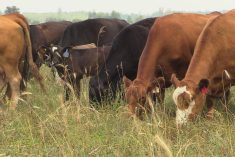The World Organization for Animal Health (OIE) now considers Canada free of highly pathogenic avian flu, the Canadian Food Inspection Agency reported Friday.
The OIE’s notification follows the end of a 90-day period after the cleanup of the most recent outbreak of the H7N3 strain of avian influenza on a poultry farm near Regina Beach, Sask.
That outbreak sickened and killed some birds on the farm last September, leading to a complete cull and burial of the farm’s 50,000-odd birds, supervised by the CFIA.
Read Also

U.S. livestock: Cattle regain ground, hogs dip
Chicago cattle futures regained ground on Wednesday after falling off a cliff late last week. Most-active December live cattle contracts…
No further cases of highly pathogenic (“high-path”) bird flu have been found through CFIA’s bird flu surveillance program in the 90 days after cleanup and disinfection were completed in January. New birds were allowed on the farm in February, 21 days after the end of the disinfection process.
In accordance with standards adopted by the OIE, Canada is now considered free of high-path bird flu, CFIA said.
H7N3 affects birds but not people, and is not to be confused with H5N1, another high-path strain. H5N1 is blamed for the deaths of at least 240 people overseas since late 2003, largely through direct contact with infected birds.
While other high-path strains can be devastating on an affected commercial poultry farm, the concern of human health experts is that a strain such as H5N1 may mutate or combine with a human flu virus that could spread more easily among people, spurring a pandemic.















